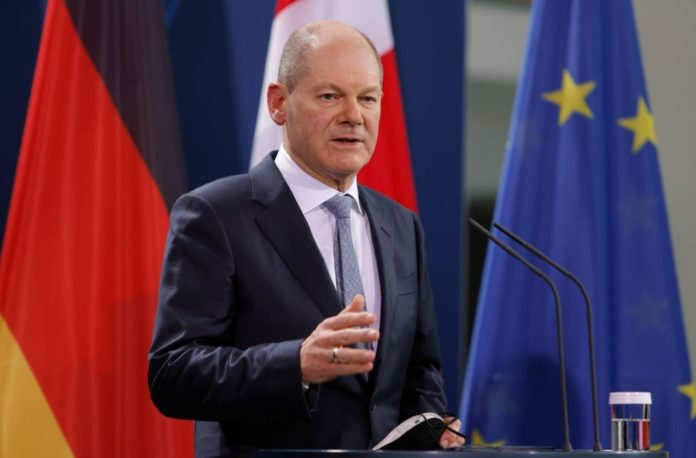German Chancellor Olaf Scholz will meet Russian President Vladimir Putin on Tuesday. If Scholz returns from the Kremlin empty-handed, Berlin’s allies will wonder what they get out of Germany withdrawing to the role of mediator.
German Chancellor Olaf Scholz has been in office for around nine weeks, and he is already facing a crisis situation that probably no other head of government in the Federal Republic has had to cope with in this dramatic way. Nothing less than war or peace in Europe is at stake. Scholz was in Kiev on Monday, where he met Ukrainian President Volodymyr Zelenskiy, and on Tuesday he will fly to Moscow to meet Russian President Vladimir Putin.
The fact that the chancellor did not travel directly from the Ukrainian to the Russian capital, but first returned to Berlin in order to set out from there again towards the east on Tuesday morning, could not least be meant symbolically: the German government may want to avoid the impression that it has Putin second priority compared to his Ukrainian counterpart.
Scholz is also fighting for Germany’s influence
The question of what Scholz can contribute to solving the crisis is currently occupying the commentators in Berlin. In the political circles of the German capital, much credit is given to the mediating role that Germany can play between the West and Russia. One continues to believe that “direct talks are important,” according to the Chancellor’s Office.
People in Berlin are attempting to justify their own apprehension in military matters by emphasizing diplomacy, which is met with less and less understanding in Kiev, as well as in the capitals of many NATO countries: the more realistic the prospect of war appears, the more skeptical the person appears, who relies primarily on willingness to talk rather than military strength.
Scholz is also fighting in Moscow to preserve Germany’s influence and prestige: If he returns from the Kremlin empty-handed, Berlin’s allies will wonder what the West will gain from Germany withdrawing to the role of mediator.
That the German chancellor could be the last Western head of state or government with whom Putin speaks face-to-face ahead of a possible invasion adds to the pressure on Scholz. Western observers believe that since the beginning of the corona pandemic, Putin has almost only met with members of his inner circle; Accordingly, certain hopes are associated with a direct address by Scholz.
Will Berlin end up sitting between all chairs?
In the worst case, Scholz runs the risk of forfeiting both: his reputation in Ukraine and with NATO allies as well as that in Russia. The Western powers could see their image of Germany as an insecure cantor confirmed, while the Russians could lose the illusion that they have a contact in Berlin through whom they can be heard in the West. So Germany could end up sitting between all chairs.
Scholz doesn’t have too many options in Moscow, especially since Berlin has to coordinate his actions with his allies anyway: The chancellor actually has little choice but to warn Putin about the human, political and economic costs of war.
In doing so, he could recall the sanctions that Europeans and Americans are prepared to take. There is now broad agreement in Berlin that the Nord Stream 2 gas pipeline will hardly go into operation in the event of Russian aggression, although Scholz still could not bring himself to say so openly during his visit to Washington at the beginning of last week. There are therefore doubts as to whether he will be able to find clear words for Putin.
Pessimism is spreading in Europe
A survey by the think tank European Council on Foreign Relations shows that a majority of Europeans no longer expect a peaceful solution to the crisis: 52 percent of Germans expect a Russian invasion of Ukraine this year. The mood in France and Italy is similar, while in Poland more than 73 percent of those surveyed expect a Russian attack.
Despite the recent escalation of the situation, Germany’s unwillingness to become involved militarily is still relatively great: according to the survey, 50 percent of Germans believe that NATO should come to the aid of Ukraine in the event of a Russian attack. In contrast, 79 percent of Poles, 67 percent of Italians and at least 55 percent of French believe that NATO has a duty to assist Ukraine in the event of war.
Image Credit: Getty
You were reading: Is this last chance for peace? Germany has lot at stake in Moscow
